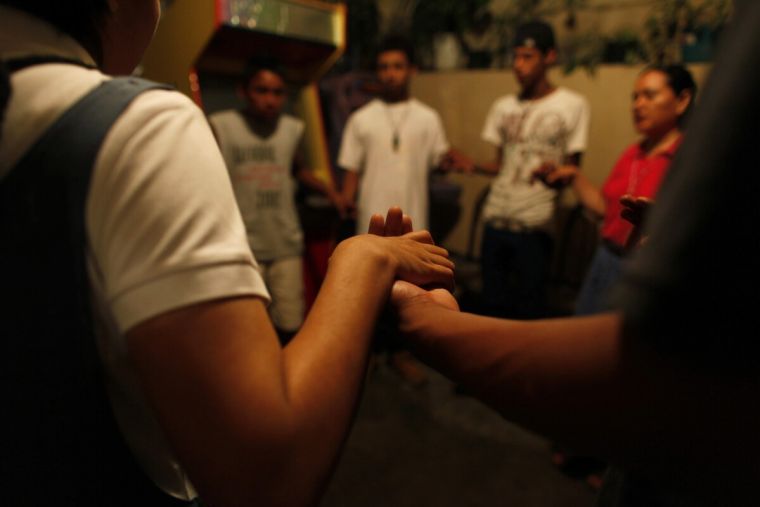Beyond us and them: What real community should look like

Society is often divided in two: the haves and the have-nots, the givers and the receivers, the professionals and the clients. We have professionals who deliver services meeting people's needs. And people's needs are met, but the way in which they are met reinforces the divide that this system perpetuates. Doctors stay doctors and patients stay patients.
What if the church could offer a radical alternative, where our identity is not found in our need or our skill, but in the innate truth that we are children of God?
It is not that providing services is bad, far from it. We need doctors, teachers and social workers. The problems begin when we start seeing church community engagement as a service meeting a need in a way that keeps the service-provider and the receiver separate; when a person's identity as God's child is usurped by what they can do or what they need.
Livability and Church Urban Fund (CUF) have produced a report -"Fullness of Life Together, Reimagining Christian engagement in our communities" - which suggests that rather than being restricted by the world's "service delivery model", which is ultimately "needs-based", the church "should be a place where alterative visions are allowed to flourish and grow, where hope is offered and new approaches found (or indeed, ancient ones re-found)".
The report highlighted four ways that this service delivery model is limiting:
- By definition, the service users come to be defined primarily by their problems or needs, encouraging dependence on the service provider to meet that need.
- There is a risk of dehumanising both the service provider and use, limiting them, respectively, to boxes to be ticked and problems to be solved.
- This, inevitably, leads to division and separation within communities, to groups being formed according to issues.
- This can consequently weaken community bonds, as the natural mutual support system withers due to disuse.
There are places in society where professional relationships are helpful. But, if we start seeing church as one of these professional bodies of experts going into communities to service their needs, we are treading on dangerous ground.
Are we not invited to build real friendships and recipricol relationships with those the world deems on the margins? Doesn't Jesus invite us all into community with one another united around him? He ate with prostitutes, tax collectors and fisherman. He treated them as whole people with things to offer and trusted that through relationship transformation would occur.
Jesus did not teach us to define others, or ourselves, by our skills or our deficits, but by the fact that we are the Father's children.
The world's service based model undermines this truth in three major ways, as highlighted in the report:
- The concept of a service user's identity being defined by a need or problem.
- The position of authority given to the service provider can be unhelpful for both parties, potentially dehumanising and disempowering them.
- The lack of space allowed for relationships limits long-term change.
Rather than depending on systems that ensure service provider and user are kept at a safe distance, enabling the user's need to be met yet ultimately disempowering them, might the Church pioneer the old model of reciprocal community and relationships?
Livability and CUF suggest there are viable alternatives to the world's way that give truer expression to the gospel's heart for community.
The first, the co-production model, seeks to empower those receiving public services by involving them in the process. This model radically reimagines the way that services are provided by seeking to engage those using the services, their families and neighbours in a recipricol relationship with the professional.
The report found that "where activities are co-produced in this way, both services and neighbourhoods become far more effective agents of change."
Adopting this approach demands a culture shift from those who deliver and receive services, and "crucially requires people to believe that they make a difference."
The second approach, Asset-Based Community Development (ABCD) seeks to build on the assets that are already found in the community and mobilise individuals, focusing on the skills present in a group of people rather than their needs.
The shift of focus away from the need towards the gift seeks to enable and empower community members to participate.
This church should not be a body of service providers seeking to meet the needs of the marginalised in a remote manner. We are not a professional institution with a set of skills which can meet the needs of a community while keeping that community at arm's length. We are a body of believers seeking to serve and transform society through relationships.
As the report concluded, "We are called to stand alongside the most marginalised in our society, to work for justice and to create communities in which a new reality is seen: to offer glimpses, however faltering, of the incoming Kingdom of God. This requires us to be alert to the ways in which we might be uncritically accepting the status quo, by listening to God and to the people of our neighbourhoods, particularly those suffering marginalisation."
If we can reimagine the church as a community, rather than a building, which extends beyond a Sunday, then this model of community engagement might begin to make more sense. It ceases to be a Sunday club with "outreach ministries" and is transformed into a prophetic community, existing in relationship with one another.











